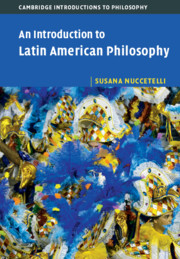Book contents
- An Introduction to Latin American Philosophy
- An Introduction to Latin American Philosophy
- Copyright page
- Dedication
- Contents
- Tables
- Preface
- 1 Setting the Scene: The Iberian Conquest
- 2 Modest and Immodest Feminism
- 3 The Authoritarian Republicanism of Bolívar
- 4 The Liberal Republicanism of Sarmiento and Alberdi
- 5 Homegrown and Imported Positivism
- 6 Martí’s Liberal Anti-Positivism
- 7 Utopian Latin Americanism: Arielism and Mestizofilia
- 8 Soft and Hard Socialism
- 9 Liberation Theology and Philosophy
- 10 Skepticism and Anti-Skepticism About Latin American Philosophy
- Glossary
- Bibliography
- Index of Names and Subjects
- References
7 - Utopian Latin Americanism: Arielism and Mestizofilia
Published online by Cambridge University Press: 15 October 2020
- An Introduction to Latin American Philosophy
- An Introduction to Latin American Philosophy
- Copyright page
- Dedication
- Contents
- Tables
- Preface
- 1 Setting the Scene: The Iberian Conquest
- 2 Modest and Immodest Feminism
- 3 The Authoritarian Republicanism of Bolívar
- 4 The Liberal Republicanism of Sarmiento and Alberdi
- 5 Homegrown and Imported Positivism
- 6 Martí’s Liberal Anti-Positivism
- 7 Utopian Latin Americanism: Arielism and Mestizofilia
- 8 Soft and Hard Socialism
- 9 Liberation Theology and Philosophy
- 10 Skepticism and Anti-Skepticism About Latin American Philosophy
- Glossary
- Bibliography
- Index of Names and Subjects
- References
Summary
Chapter 7 considers José Enrique Rodó’s (Uruguayan, 1872-1917) and José Vasconcelos’s (Mexican, 1882-1959) models of Latin America’s identity, each of which rejects positivism and US values. In his Ariel, Rodó declared US values pernicious for the youth of Latin America, while in his Cosmic Race Vasconcelos advanced a utopian vision of a Latin American race that would develop superior values to those of the other races of the world. On the analysis offered here, Rodó’s reaction is a form of elitism based on ethnocentric bias as well as misinformation and fallacy. After all, Arielism traces the roots of Latin American identity to the values of Christianity, colonial Spain, and ancient Greece and Rome. As a result, Rodó’s Arielism offers a view of Latin American identity that disvalues the contributions of peoples of non-European descent such as Amerindians and Afro-Latin Americans. Furthermore, it charges without evidence that utilitarianism is the value theory prevailing in the United States. By contrast, Vasconcelos’s pseudoscientific version of the mestizaje model provided a theoretical framework that was instrumental in recognizing the contribution of traditionally marginalized peoples to the identity of the region. This chapter argues that his model is thus more defensible than Rodó’s.
Keywords
- Type
- Chapter
- Information
- An Introduction to Latin American Philosophy , pp. 152 - 172Publisher: Cambridge University PressPrint publication year: 2020

